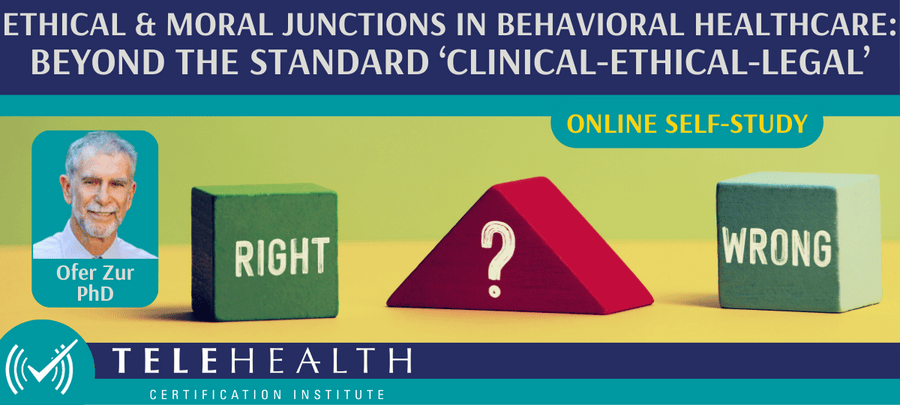Ethical & Moral Junctions in Behavioral Healthcare: Beyond the
Standard ‘Clinical-Ethical-Legal’
Enroll in the Online Self-Study course and complete it at your own pace.
0 CE hour available for behavioral health clinicians upon completion.

Ethical dilemmas in behavioral health are rarely clear-cut—and the real challenges often arise at the moral junctions where professional codes, personal values, and client welfare collide. This course dares to explore what happens beyond the standard 'clinical-ethical-legal' model, where risk management isn’t the only compass guiding your decisions.
In this provocative and timely self-study course, you’ll be invited to sit with the discomfort of complexity, ask hard questions, and develop the moral courage needed for truly ethical care. If you’ve ever felt conflicted, constrained, or confused in ethically gray moments, this course offers a powerful framework for reflection and clarity.
Enroll in the 0 CE Online Self-Study for $25
Payment Options are listed at checkout
Dr. Ofer Zur, Ph.D., is a renowned psychologist, ethics consultant, and founder of the Zur Institute. With decades of experience teaching ethics and consulting on clinical dilemmas, Dr. Zur brings unparalleled depth to the nuanced conversations that most CE courses shy away from. His work on boundaries, dual relationships, and risk tolerance has helped shape modern ethical practices in behavioral health.
Dr. Zur’s teaching style is provocative yet compassionate, blending real-world examples with philosophical inquiry and cultural context. Rather than offering prescriptive answers, he challenges clinicians to pause, reflect, and identify their own ethical-moral junctions with awareness and intention.
Topics explored include involuntary hospitalization of suicidal clients, clinical dishonesty and self-disclosure, diagnostic manipulation for client benefit, managing boundary crossings, digital-native vs. digital-immigrant value systems, gender-affirming care for minors, abortion counseling, the ethics of psychedelic therapy, and how context shapes perceptions of professionalism—including situations as unexpected as nudity in communal spaces.

Instructor
Ofer Zur, Ph.D., is the founder of the Zur Institute. He is a licensed psychologist, instructor, forensic and ethics consultant, and expert witness in Sebastopol, CA. His writing and teaching in the US and abroad focus on ethics, critical thinking, boundaries, dual relationships, managed-care-free private practices, victims, psychology of war, and psychology of gender. For many years he taught at graduate schools, such as the CSPP (Alameda, CA) and CIIS (San Francisco, CA). His books include Dual Relationships and Psychotherapy (2002, co-edited with Arnold Lazarus) and HIPAA Compliance Kit (2003, Revised 2016, 2018). His book, Boundaries In Psychotherapy, was published in 2007 by APA Books. His latest book (2017) is Multiple Relationships in Psychotherapy and Counseling: Unavoidable, Common and Mandatory Dual Relations in Therapy, published by Routledge.
Key Takeaways:
Clarify complex decision-making frameworks: Learn how to distinguish between clinical, ethical, legal, and moral factors that shape therapeutic choices.
Expand your ethical lens: Gain deeper insight into how context, culture, and personal risk tolerance impact real-world clinical decisions.
Strengthen professional self-awareness: Cultivate the ability to identify and reflect on your own moral-ethical junctions and navigate them with confidence.
Why this course?
Real-world relevance: This course confronts the challenges clinicians actually face—not just what’s written in textbooks or licensing exams.
A leading authority: Dr. Zur’s expertise in ethics, boundaries, and forensic consultation ensures rich, credible content rooted in clinical reality.
Beyond checkbox ethics: Telehealth Certification Institute delivers education that aligns with your values, empowers your judgment, and respects your humanity.
Learning Objectives:
Differentiate between clinical, ethical, legal, and moral decision-making frameworks in behavioral healthcare.
Identify and reflect on ethical-moral junctions that arise in complex clinical situations.
Evaluate how context influences ethical choices in diverse practice settings.
Analyze case examples involving common moral dilemmas.
Recognize the impact of personal moral stances and risk tolerance on clinical decision-making.
Whether you're navigating nuanced clinical risks or simply seeking a deeper understanding of how to align your values with your practice, this course provides space for reflection, humility, and growth. Join us in rethinking what ethical excellence means in behavioral healthcare.
Add this to your course library to begin learning instantly.
This is a non-interactive, self-study course. It consists of video instruction and a course evaluation. It does not offer CEs, just valuable content for your practice.
Select each tab for course details
Availability: From the time of registration, you have six months to access the coursework.
Who Should Attend: This course is intended for clinicians who provide behavioral health services.
Teaching Methods: This is a non-interactive, self-study course. Teaching methods for this course include recorded lectures, videos, a post-test, and a course evaluation.
How to attend: Directions for completing a course can be found by clicking here.
This program was recorded on July 21, 2023.
Testimonials
Bridgette Nalumu
Public health consultant, Green and Purple Consultancy Network
Lora Verley
Clinical Therapist, Bayless Integrated Healthcare
Jackie Tanna
Therapist, Region One Mental Health
Jackie Bell-Russell
Therapeutic Behavioral Strategist, Rialto Unified School District